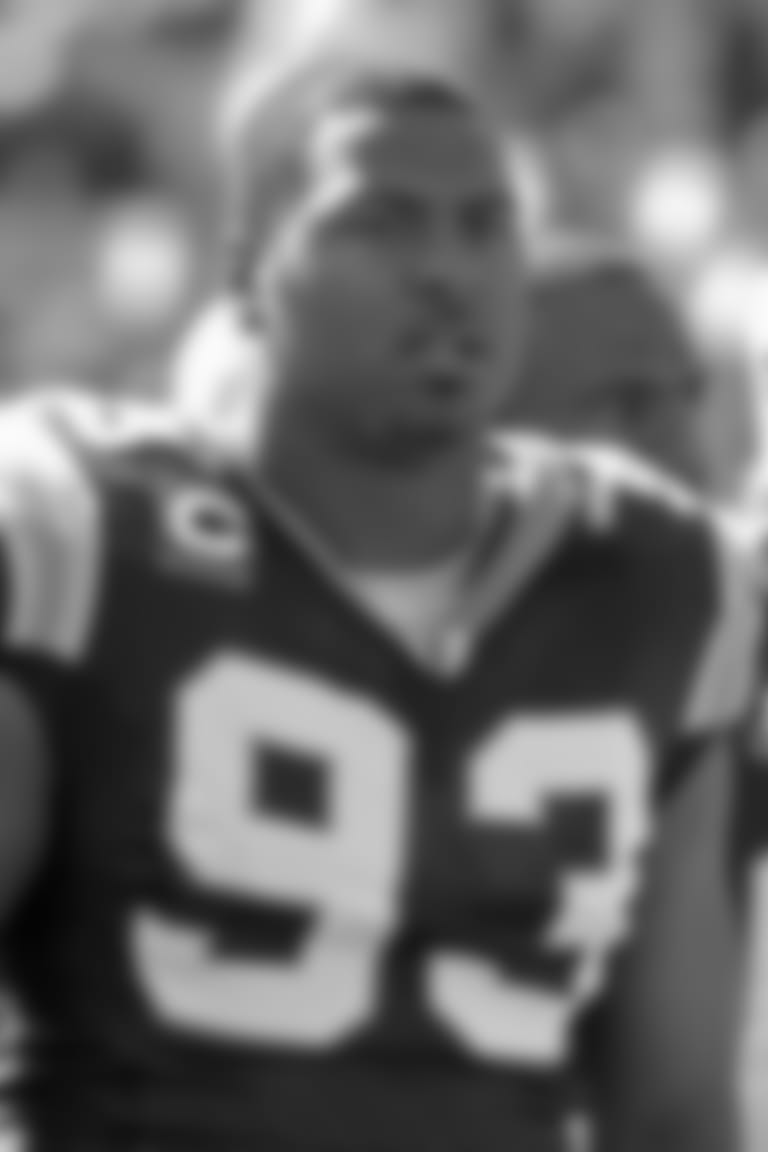CHARLOTTE — There's no handbook for becoming an interim head coach of a 1-10 team that's 10 months removed from hiring the previous coach. Just like there was no handbook for becoming an interim coach during the COVID-19 pandemic.
But really, there's no handbook for being a special teams coach anyway because you're always working with leftovers, and one injury or one seemingly unrelated roster move could upend an entire week of planning.
So if you want to live this life, if you want to walk this road, it's best if you can maintain a sense of humor because the seasons can be long, and the payoff is often only eventual. It's also essential to treat everyone you encounter with respect since anyone on the roster could end up playing for you at any time. But mostly, it helps to be the kind of human being you'd want coaching your kids, someone who'll offer a second chance, to show some grace when it's needed, and support them no matter what.
If there are ever days Chris Tabor isn't sure what kind of coach he ought to be, he doesn't have to look far for a reminder.

Tabor keeps the lights low in his office anyway since there's always a screen showing practice footage or game tape on one of many monitors that surround his desk and the facing wall. There's usually some mood music in the background and a candle lit when he's in there, which gives it the ambiance of a small chapel, or a living room at least.
And there, on a credenza over his left shoulder, sits his shrine. Next to a framed motivational graphic titled EFFORT, a black and white photo of an old coach, a man living his life in athletic gear, practice plans folded in his left hand, looking like he's heading straight to the next drill because there's always a next drill and that's the most important one.
Don Tabor is never far away, even when Chris Tabor isn't sitting next to that photo of the man who spent 40 years coaching high school football, 32 of them in his hometown of St. Joseph, Missouri. When you listen to the Panthers interim head coach talk about his father, talk about playing pickup games in the vacant lot next to the Mason place across Felix Street, it's not hard to imagine that coaching football would be all he ever wanted to do.
"I don't know if that's what I wanted to do; it's more I just wanted to be my dad," Tabor said this week, hours after getting this unlikely job. "That's probably what led me to it. You know, if he was in a different profession, I probably would have been that, to be honest with you.
"Special man. Cared about people. He was a daily Mass guy. Always saw the good in people, but at the same time, he could be tough on you and push you. He had a great skill of recognizing the potential of people and players and getting them to that point, and trying to take them a little beyond. I think that looking back now, knowing what I know and what I try to do, that he did that."
That sounds a lot like what Chris Tabor does now.
"Maybe," he replies with a shrug. "But the goal is who I'm trying to be, within who I am."

So, if you want to know what kind of coach Chris Tabor is and could be, it's probably worth knowing a little more about what kind of coach Don Tabor was.
In short, he was the kind of coach who was willing to forgive a young Mike Rucker for making a foolish mistake based on little more than youthful pride because he saw what Rucker might turn into.
Before he'd become a Pro Bowl defensive end for the Carolina Panthers, before he'd help lead a team to an unlikely Super Bowl run, before he'd play nine years in the NFL and retire healthy and wealthy and wise, Mike Rucker was a cocky kid who thought he knew better.
When Rucker was a sophomore at Benton High in St. Joseph, he might have imagined some of those things, but he thought he was a different kind of star. He thought he was a middle linebacker, on two feet with a clean uniform in the middle of it all, not a guy in a three-point stance lost in a pile of bodies.
So just before the big preseason jamboree, when the whole town turned out full of anticipation, and the Friday night lights were still fighting for attention with the setting summer sun, Don Tabor not only changed Mike Rucker's position, he changed his life.
"He came to me at practice, and he's like, hey, I'm going to move you to defensive end," Rucker recalled. "And I was just so upset because I felt good about my position. I loved the position. Everybody can see it's one of those great positions. You think about Dan Morgan and Luke Kuechly and being able to do it all and just look good."
Rucker wasn't hearing it. He knew he was a linebacker. So he did what a high school sophomore, gassed up by his buddies who also knew better than the old man would do. He quit the team.

"I just thought it was bogus that he would move my position right before the jamboree," Rucker said. "And I remember being on my couch. A couple of days went by, and the phone kind of stopped ringing. And I'm thinking, if no one called, how am I going to reach the National Football League if I don't play football?"
At a certain point, sitting alone on the couch and listening to that phone continue to not ring, Rucker stood up and said: "Come on, knucklehead."
So he called Don Tabor, unsure how it was going to go.
"I remember having this conversation and apologizing to him, and he forgave me and allowed me back on the team," Rucker said. "Basically, he told me, hey, I knew your dream, and I knew that if you were going to fulfill that dream, it wouldn't be playing linebacker; it would be with your hand in the dirt. So, that move was to help you in your development and to help you with your goal.
"And that was one of my big 'aha' moments. Sometimes, people would do things in our best interest that we don't know. And he changed my life forever because, if I wouldn't have changed, I don't know where I would be. So that's one of those moments where he cared for me more as an individual versus a player and helping the team in this position.
"So I'm always grateful, always thankful for him looking out for me in that way, even though I was a knucklehead at that time. I'm thankful that he forgave me and allowed me that space of forgiveness and to be able to get back on the team."
As it turns out, Rucker playing defensive end worked pretty well, and he eventually helped Benton to the state semifinals against Webb City. Webb City had a big defensive end named Grant Wistrom, who was the name recruit in Missouri at the time. So when Nebraska came to watch Wistrom, they happened upon this Rucker kid at Benton and figured they should be keeping tabs on him too.
"The coaches came to that game, and that's where Nebraska saw me for the first time," Rucker said. "So, it gives me chills thinking about it because that was due to coach Tabor and that opportunity and putting me in the right position to go against the guy that played the same position as I did, and Nebraska watching me the whole game, and then me jumping on the radar because they were looking at Grant Wistrom.
"It just brought it all the way around. All because of what he did."

(There's a parenthetical side note that goes here if you're telling this story chronologically, and because it touches on the other side of growing up Tabor. When Rucker was in high school, Chris Tabor was a student teacher and helped his father coach Rucker's team — Tabor's 52 now, Rucker's 48, so they're nearly peers. Asked what he taught, Tabor shook his head and said, "phys ed and health," as if there was any other answer. He shuddered when he recalled teaching middle school PE — "this is not for me," he said — and high school PE was just OK.
"My favorite when I student-taught was elementary school PE; I had a blast," Tabor said, minutes after owner David Tepper introduced him as the interim coach of an NFL team. "Those kids, we just played and played. I had the parachute game going, with the balls and everything. It was the best."
Similarly, Tabor's portions of practices have a certain energy. "It's because he's a 12-year-old at heart," his sister pointed out.
The Tabors look out for their people. But they also know this is supposed to be fun.)

The things Don Tabor did for his family seemed so normal at the time, and only with the benefit of hindsight did they realize it was remarkable.
Don and Mary Jane Tabor were the proud and dutiful parents of five kids. Chris is the second-oldest boy, followed by the only girl, Elizabeth, and then the twins.
They didn't quite make up a football team by themselves, so they'd often dig into the used equipment their father brought back to the house, gather up as many friends as they could, and march across to the corner of Felix Street and 27th to the open lot for games of, what else, football. (Also, one of the Mason kids whose family lived next to the open lot now lives in Gastonia where he can keep tabs on Tabor, because apparently, community is forever).
"We grew up with football," Liz Weddle said. "That was our thing, you know."
It did not matter in the least that Liz was younger and smaller, and it certainly didn't matter that she was a girl.
"I'll tell you what, if I heard it once, I heard it a million times, 'Put her down; she's not the ball,'" Weddle said with a laugh. "I got sandwiched between these boys. So you know, if I was going to survive, I had to learn how to play, I had to toughen up, and I couldn't be a little crybaby, and that's how we were all raised. You know, if you're going to play, toughen up and go play. There aren't a lot of excuses that were tolerated, that's for sure.
"Just because I was a girl didn't make everything easier. Now, the boys might say differently. But at the end of the day, Mom and Dad didn't treat us differently."
When Chris Tabor and his sister describe their growing up, it sounds as wholesome and Middle America as amber waves of grain. We're talking about the 1970s and '80s, but it sounds like a childhood from decades earlier — Happy Days, if not Leave It To Beaver. Life centered around school, sports, St. Francis Xavier Catholic Church, and the roving gang of neighborhood kids who geared up in the old pads and helmets that couldn't be refurbished for the JV team that Don Tabor stored in their garage.
Chris recalled stacking televisions on top of each other to watch New Year's Day bowl games, and the fancy television with the remote always got the best game. You could stack them because back then, television sets came in big wood-paneled boxes, as heavy as furniture because that's what they were. "Those were the good days," Chris Tabor said, grinning at the memory of watching the Rose Bowl and the Orange Bowl and getting up to manually change the channel on the backup TV to see the Cotton Bowl when single-word descriptors were all the name a real bowl game needed.

"Mom would make a ton of food, we'd have all our friends come over, and we'd watch games the whole day, and it was awesome," Tabor said. "Those are really fond memories. I love bowl season, but it's not quite the same as what it was when you were growing up. You know what I mean?"
He talks about it like it was a different time because it was.
Mary Jane Tabor was a stay-at-home mom, and Don was a high school football teacher and coach. It took the kids years to realize that the reason Dad was always hustling extra work as a basketball referee in the winter or a baseball umpire in the summer wasn't just because he loved sports (though he did), but that it took everything they could scratch up to keep five kids fed and dressed and active.
"So he worked a lot, and we never knew that he had to, you know what I mean?" Liz said. "Like, we never thought in a million years we weren't the richest people in the world. Because there wasn't fighting, there wasn't bickering, there wasn't worry, there wasn't stress, there was just love in my parents' house.
"So it's just funny to me now because you look back and you go now, wait a second, I didn't get a Barbie Dream House or whatever. But I didn't care. It just didn't matter. That's not who my parents were. We had each other, and we were each other's best friends, and we had a neighborhood full of kids. So, you go outside, you learn how to build relationships, and you learn how to play with others, how to get along, and how to fix problems.
"And you know, that neighborhood taught us a lot."
(Little did Don Tabor realize he was teaching his kids to be special teams coaches, except the ones he was teaching to be nurses because somebody has to take care of all these people who come home scraped and bruised and bloodied from playing football in an empty lot.)

But now that she thinks about it, she realizes she might have gotten some special treatment by being the only female in the family — not that she always wanted it.
When Liz was 16, she was finally allowed to go on an unsupervised date, or so she thought.
"I get to go on my very first car date, and I'm going to the movies with this fella," she recalled. "And I'm sitting there, and I hear all this giggling behind me, and I turn around, and there's all four of my brothers sitting behind me, and they each brought a friend. And I was absolutely humiliated that they all followed me to the movies, and I went home crying, and I was devastated. And my mom said, 'Oh my God, what happened?' She was thinking this date was terrible. And I said, 'Mom, all my brothers sat behind me.'
"And then I heard my dad say, 'Boys, I didn't say sit directly behind her,' and I was like, 'Oh my God, he's in on it too.' I guess protective is probably a good word. Humiliating for me is another."
Suffice it to say, that date did not turn out to be the future Mr. Weddle.
"No, I think that scared that poor kid off," she laughed. "I mean, wouldn't it scare you off?"
Weddle said that her brother is far more protective over his daughters and nieces than she recalled him being of her.
In the extended Tabor family, Chris is clearly the fun uncle, which is why none of his nieces ever call him Uncle Chris.
No, back in St. Joseph, Chris Tabor is Jell-O.
"The kids said it was because he was jiggly," an unnamed sibling confided, their name withheld to protect the innocent.
"Maybe it was before I had this six-pack," Tabor, the former Benedictine College quarterback, said with a laugh when asked about the nickname.

(Also, nicknames are a thing with this crowd. Tabor comes up with good ones for all of his players. There is a current Panther who is very loyal and eager and agreeable. He will do anything and everything they ask of him with a smile on his face. He is soft-spoken and, perhaps, on the innocent side. Tabor calls him "Groot.")
They laugh, they have fun. And they also look out for each other.
Since Liz is a nurse back home, she's in charge of looking after her 85-year-old mother (Don Tabor died in 2008). That house on Felix Street where the five kids grew up is still there, and she's still in it, 50-plus years after she moved in. Mary Jane had a bit of a rough summer with some health problems, and she no longer gets to drive.
"My mom always kind of gets put in the background, you know," Liz said. "But at the end of the day, my mom, she's way tougher than any of them. I mean, she's always the rock; she's always there. She's kind of quiet in the background, but, you know, don't try to tell her she can't do something or don't look at her like she doesn't understand football. She gets it; she gets the whole picture."
Asked to describe their mother, you can tell Liz has been waiting for the chance.
"You've got to meet her," her daughter said. "She's really funny. She's really sweet. She really is that grandma that you're like, I want to go to my grandma's house. And you go in, and it smells like chicken noodle soup and homemade chocolate chip cookies, and the fire's on, she's that lady.
"Like you go there and it's just cozy. She's cozy. That's what she is. She's just, she's awesome. My mom is so awesome."

And even though she's had a rough few months, Mary Jane is still keeping up with what's going on here.
"Talked to Mom the other day; she said she couldn't get our game on TV, but she listened to it on the radio," Tabor said. "Actually, she said she listened to people talk about it. She was listening to a podcast. She said they were funny." (The Tabors love to laugh and were clearly raised to be kind.)
As the one who moved farthest away (three of the five kids are still in St. Joseph), Chris Tabor carries a certain guilt that his siblings are carrying the burden of looking after Mom back home. But he clearly warms up when he talks about being back there.
"When he comes home, he sleeps in the same room he slept in his whole life," his sister said. "It looks a little different, but it's still the same house, and I do know he misses that, and he loves to come home. Because not many people can say they're going to sleep in the same room they slept in their whole life."
Home seems to be that common thread in Chris Tabor's life, even though he's half a country away. Maybe that's why his office is still such a popular gathering place, with the lighting, the music, and the candles. It smells nice in there, maybe not like chicken noodle soup and chocolate chip cookies, but not at all like locker room. Almost, say, cozy.
He's not moving down the hall and to the right to where Frank Reich sat last week; he's staying put in his usual spot, halfway down the hall on the left, still one of the bigger rooms for an assistant coach but not nearly a head coach's office. He's got a couple of comfortable chairs in there to the side of his desk, so guys can come up for meetings and stay for a while. People gravitate there. There is often someone leaning against the doorway if the chairs are full.
With most position groups, the meetings are on the ground floor of Bank of America Stadium. But since special teams encompasses everyone on the roster except the quarterbacks (and even backup Andy Dalton when they needed a holder since Johnny Hekker was out Wednesday while his wife had a baby), he'll use the team auditorium for most of them. But if it's just his specialists, they usually come upstairs.

So Hekker, kicker Eddy Piñeiro, and long snapper JJ Jansen are often hanging around. Check that — Big Bad John, El Conquistador, and JJ. "Even though he has many words, Jansen's too boring for a nickname; he's just JJ," special teams assistant Devin Fitzsimmons says with a laugh after warning you about using his "government name." Fitzsimmons is just Fitz — "Four letters, one syllable."
These guys have fun together.
But it's not just laughs, because fun isn't always guaranteed in this business.
Not when you're 1-10.
Not when you miss kicks.
Not when you're late to practice.
Not when real life intrudes.

He grew up with traditional values but can comfortably identify with people who grew up in different circumstances. One of his former core guys was known around the building as Champ, and Champ grew up in a homeless shelter in Camden, New Jersey, a world away from the utterly normal and idyllic Tabor Midwest.
But once they're here, no matter where they're from or what they did to get here, he has their backs.
If one of his guys misses a field goal in Atlanta to lose a game, Tabor will remind reporters every week exactly how many consecutive field goals he made afterward. If one of his coverage players commits a foolish penalty, he'll bark at them, he'll show them the tape, and he'll hug their neck and they'll go on the field smiling as they correct it. If one of his players loses a parent, they'll sit in that quiet room with the soft music and the candles, the cozy place that smells good, and that player will likely hear some stories about Don Tabor.
Chris Tabor will pull out his phone and show the photo of the tombstone, which reads March 19, 2008, and he'll softly say, "It seems like he just passed yesterday."
These are intimate conversations, in addition to the fun football ones.

It's a little like family. And those who grew up with him are clearly happy that he's getting the chance now to lead a whole football team, even if it's only for six weeks. Liz came to Charlotte a few weeks ago for the Dallas game, and it not going well did not diminish her pride.
When Rucker talks about Chris Tabor, there's a clear sense of admiration for a guy just four years older. Even though he went to Division I powerhouse Nebraska, he said kids back in St. Joseph were in awe of Tabor since he was a college quarterback (even if it was at an NAIA school).
"He was the guy the town paper covered," Rucker said. "It was pretty cool because, in our eyes, that's what we wanted to do. We wanted to follow in his footsteps. We wanted to go play at the next level regardless of what level that was."
Get Rucker talking about the Tabors and St. Joseph (he's a big Liz fan), and he starts talking about those Midwestern values that seem quaint now but actually aren't because they're timeless. "You grow up like that, you don't lose that thread," Rucker said. "Your yes is going to be yes; your no is going to be no. And you're going to have respect, and you're going to respect hard work, right?"
And Rucker clearly thinks that can help what's going on here now.
"In the football world that we know you got to win ball games, we know you got Xs and Os, but you can have fun doing both," he said. "And I think that type of attitude can rub off really easy, that we can have fun doing this thing,
"So, hopefully, that enthusiasm rubs off. His dad was like that, too."

Rucker said he remembered Don Tabor walking past one day while he and his buddies were goofing off before practice, booting balls straight-on like Mark Moseley. Don Tabor recognized Rucker had a big leg. Rucker ended up kicking off that year for Benton, in addition to being a converted-against-his-will defensive end. If you learn anything coaching special teams, it's "the more you can do," even if it doesn't look normal.
That's why at this point, Tabor might be the perfect guy for an imperfect job.
Nothing has been promised to him. They need him to grab ahold of a bad situation and make it a little less bad. If he can make something of it, great. But mostly, they want him to take this odd lot of parts and see if he can turn it into some kind of whole. They want him to take something that's broken and bring the pieces together. To gather up the kids to walk out of the stadium and across the creek to the open field to play some ball.
It's a little like the lot across Felix Street.
It's a little like coaching special teams.
And it's exactly like what Don Tabor taught him to do.
But more importantly, it's what Don and Mary Jane Tabor taught him to be.
















